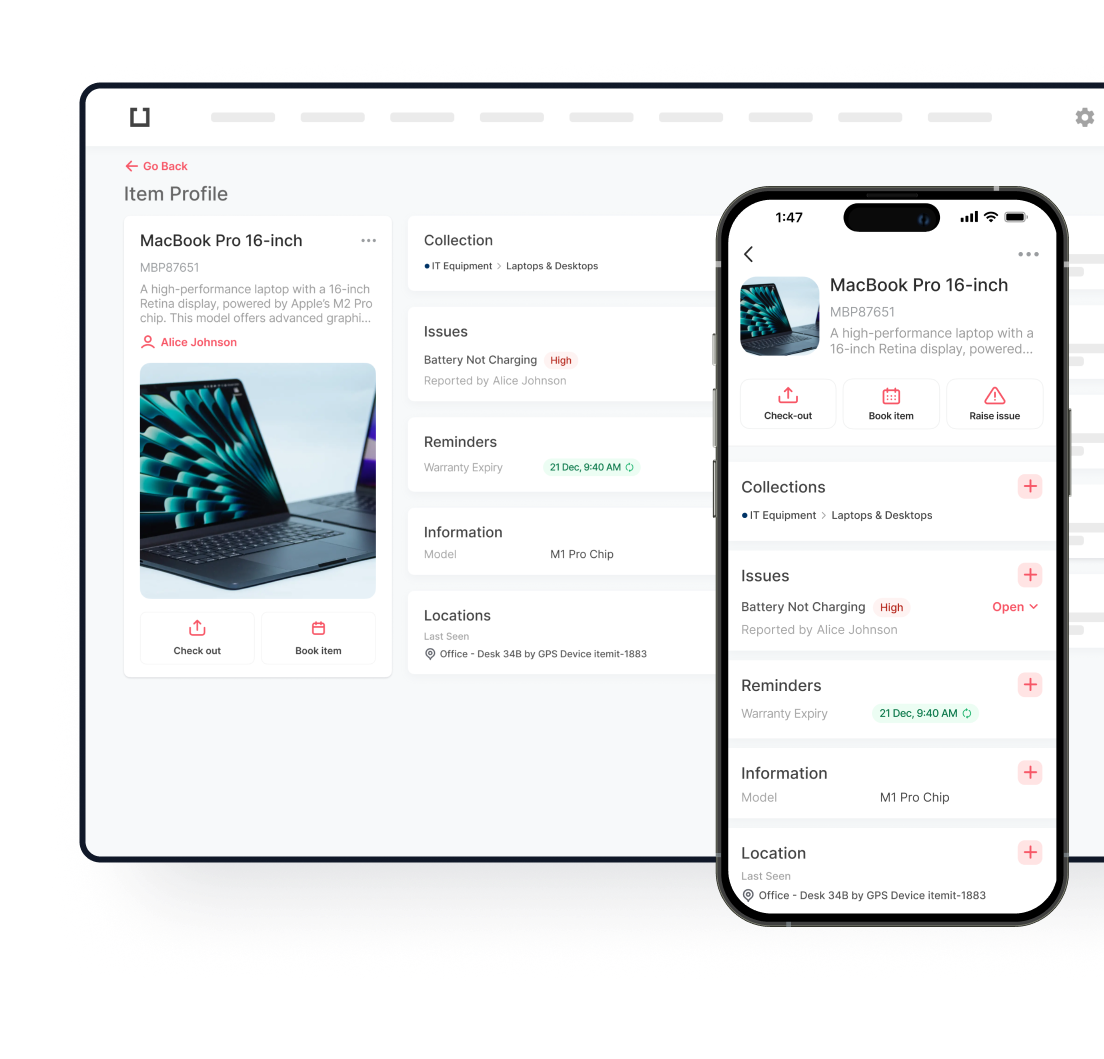
Asset register software gives you a more automatic way to manage your assets and their data. It has an edge over spreadsheets as, instead of editing singular cells, you edit and manage asset data within a profile of that asset.
In other words, you’ll be able to add asset issues, bookings information, and location data against the assets themselves to save this data from getting lost in a large spreadsheet.
An asset register is effective at preventing asset losses and duplicate purchases, but only if your data is visible, usable, and editable.

The Benefits Of Asset Register Software
Asset register software gives you many benefits, including an automated way to track and manage your assets.
So, if you’re using asset register software for IT asset management, you’ll be able to log each laptop as an individual profile. If you’re creating a school asset register, you can add PAT test information and reminders against specific assets.
Overall, this saves you time as you can create effective and speedy asset operations using your asset register software. You also save money, too, as the clarity and transparency you get from asset register software reduce risks, such as the risks of ghost and zombie assets.
So, when should you use asset register software?
When Collecting Asset Data
First of all, you should use asset register software when interacting with assets and collecting data. This can be daily operations or weekly audits, for example.
As asset register software has helpful, dedicated features it will speed up these operations and take out much of the manual work involved. For example, if you want to report that an asset has an issue, you need only click one button.
Asset tags can help with this too. Asset tags are physical tags that you can stick onto your assets and link with their digital counterparts. Then, every time you scan an asset’s tag a few things happen:
- The asset’s profile opens, ready for edits
- The asset’s last seen location updates (using your phone’s GPS)
- The user who scanned the tag is logged
- The time of the scan is logged
This speeds up data collection, asset interactions and automates asset location tracking in the process, giving you a clear audit trail.
For Tax And Insurance Operations
You should also use your asset register software for tax and insurance purposes. When you collect asset data, it is all automatically logged in a reporting page.
Here, you’ll be able to export snapshots of your asset data as a pdf or a spreadsheet. The pdf functionality is incredibly helpful for auditing purposes as you get an image of your asset and all of its data, ready to send on.
First of all, this proves that you own this asset and that you’re using it responsibly. So, should you need to make a claim you can show your insurers where the asset was last seen and whether it had any known issues. This type of tracking can also lower your premiums, too, so it’s worth letting your insurer know that you’re using asset register software!
Overall, though, asset register software gives you a list of assets and data related to them. This is great when you’re logging expenses as it means you’re less likely to miss out assets or add too many, at the very least giving you accurate tax returns and at the most, helping you avoid fines.
For Fixed Asset Management Operations
It’s also possible to use your asset register system as fixed asset register software. This way, you’ll be able to add depreciation data to your assets and track how they depreciate over time.
Therefore, asset audits are sped up when you’re both physically auditing a location and when you’re auditing the costs, status, and existence of your fixed assets.
Asset register software gives you a clear view of what you own, how it’s behaving, and who is responsible for it, meaning that you should use asset register software whenever you’re tracking your assets.
itemit’s asset tracking software does all of this and more. To find out more about how itemit’s asset tracking software can help your business save time and money, you can book a demo here, contact the team at team@itemit.com and start your 14-day free trial by filling in the form below.

Try itemit
Choose a better way to track
your assets.
Start your free 14-day trial now!

Keep Learning
itemit Blog
Tips, guides, industry best practices, and news.
When Should I Update My IT Asset Register?
Having an IT asset register is useful if it is updated regularly. When should you update your IT asset register? Read this article to find out!
What Is An Asset Register?
Is an asset register a document? It can be, but an asset register can also be a reliable and easy-to-use app. Read this article to find out more!
The Best Way To Create An Asset Register In 2023
Having an asset register is important to businesses as it allows for better asset control. Find out about the best way to create an asset register in 2023!



